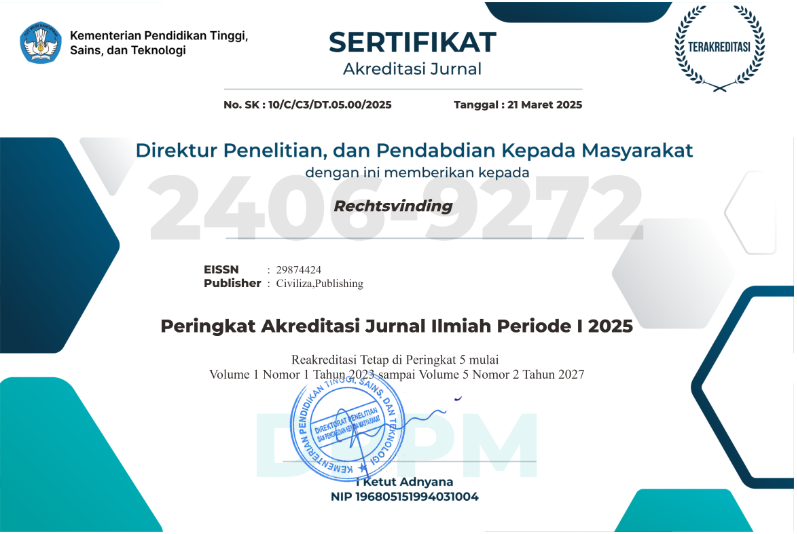Legal Review of the Provisions on “Cohabitation” Based on Law Number 1 of 2023 Concerning the Criminal Code
DOI:
https://doi.org/10.59525/rechtsvinding.v3i1.679Keywords:
Cohabitation; Criminal Code; Legal Protection;Abstract
Cohabitation or kumpul kebo is a popular term in society to refer to people who live together as husband and wife but are not married or outside of a legal marriage as regulated in Law Number 1 of 2023 concerning the Criminal Code. The research method used is normative juridical or library research, by analyzing library materials or secondary data that are relevant to the topic. This research is descriptive analytical, namely data obtained and processed and analyzed to provide a comprehensive picture of the legal regulations on Cohabitation as regulated in Articles 412, 417, 418, 419 with data collection methods through document studies. The results of the study show that the provisions of the laws and regulations governing cohabitation in the new Criminal Code create legal uncertainty and even lead to the criminalization of all perpetrators of sexual intercourse who are not bound by a legal marriage to become a criminal offense that results in the restriction of a person's individual rights which causes the loss of human rights protection as regulated in the 1945 Constitution.
References
Anwar, S. (2020). Rights and Obligations of Husband and Wife in Al-Hidayatulloh, H. (2020). Rights and Obligations of Husband and Wife in the Qur'an. Journal of Islamic Family Law, 4(2), p.145.Qur'an. Journal of Islamic Family Law, 4(2), p.145.
Canadian Criminal Code,. (nd). https://laws-lois.justice.gc.ca/PDF/C-46.pdf
Danardana, A., & Setyawan, VP (2022). Criminalization of the Social Deviance Phenomenon of Living Together (Samenlaven) in the Perspective of Criminal Law. Justitia et Pax, 38(1), 209–238. https://doi.org/10.24002/jep.v38i1.5713
Dwipayana, IGAGK, & Wirasila, AAN (2020). Regulation of Cohabitation in the Reform of Indonesian Criminal Law. Kertha Desa Journal, 8(1), 1–12.
Girlie, L. . G. (2023). The Crime of Cohabitation. Institute for Criminal Justice Reform. http://www.icjr.or.id
Habil Ildi Qayyum, Yon Efri, RSP (2025). Criminological Review of Living Together (Samen Laven) as a Phenomenon of Social Deviant Behavior. Contribution 12 Journal, 03(02), 164–179.
Harahap, M., Lubis, MA, Lubis, HF, & Rizky, A. (2023). Reflections on Criminal Law Politics. In Eureka Media Aksara. Eureka Media Aksara.
Indian Penal Code. (1960). https://www.indiacode.nic.in/handle/123456789/2263?sam_han-
Kartodinudjo, PMY (2023). Review of criminalization of cohabitation from a criminal law perspective. Indonesian Journal of Law and Social-Political Governance, 3(2), 1309–1324. http://jurnal.untag-sby.ac.id/index.php/sosialita/article/view/7952
Lubis, M. yusrizal adi & MA (2024). Constitutional Law. In Constitutional Law (I, pp. 1–250). Eureka Media Aksara. https://repository.penerbiteureka.com/publications/563313/hukum-tata-negara
Mahmud, P. (2005). Legal Research. Kencara Prenada Media Group.
Setyawan, D. (2024). Criminalization of Cohabitation: A Study from a Moral Aspect,. 13(3), 294–306.
Sukanto, S. and SM (2009). Normative Legal Research: A Brief Review. PT Raja Grafindo Persada.
Law Number 1 of 1946 concerning the Criminal Code.
Wowor, BY, Paransi, E., & Bawole, HY (2024). Eradication of Cohabitation (Kumpul Kebo) in Indonesia in the Perspective of Positive Law. Lex-Administrantum, 12(5). https://ejournal.unsrat.ac.id/v3/index.php/administratum/article/view/57862/47532
Downloads
Published
How to Cite
Issue
Section
License
Copyright (c) 2025 Azwir Agus

This work is licensed under a Creative Commons Attribution 4.0 International License.








